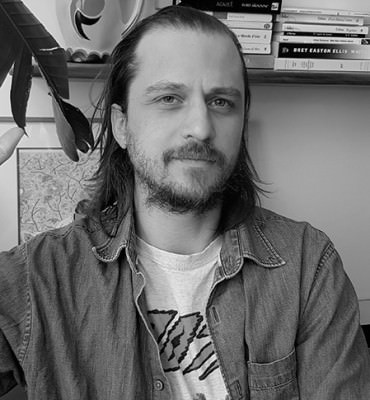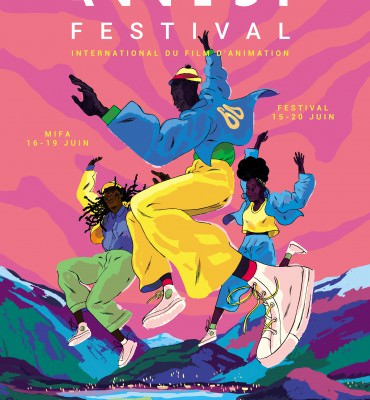Yann Fabès: "We should no longer think of Atelier de Sèvres as just a foundation course but as a higher education establishment"
Yann Fabès takes his role as director very seriously. Passionate about teaching and the transmission of knowledge, taking over as director at Atelier de Sèvres was a logical step for this artist. An entrepreneur at heart, he began his role as head of the establishment with several projects in mind. Yann Fabès spoke to us about his career path, his teaching vision and Atelier de Sèvres.
Tell us about your career path...
Yann Fabès: I studied sciences for my high school diploma but I soon realised that it wasn’t a field I enjoyed and that I didn’t want to become an engineer. So I joined a photography school and then a year later I went to art school to broaden my perspective. After five years of studies, I started working as an artist. My thing was to question and transgress the image via different mediums. This artistic work led to me being exhibited in galleries, art centres and museums in France and abroad.
How did you get into teaching?
Pretty soon—three or four years after the end of my studies—I started teaching art at the École supérieure d'Art et Design de Saint-Étienne. Very quickly, the question of transmission became an exciting vehicle for me, which brought me a lot in terms of creation. In the end, things were done in parallel to my work as an artist, for several years.
You have gone from being a teacher to becoming director of studies, a position of responsibility...
Yes, my work has evolved and my responsibilities have increased too. The school entrusted me with the coordination of the Art specialisation, then the general coordination and then I become director of studies. During this period of time, I also reduced my connection with creation.
How did this transition from art to teaching take place?
I was seeing a lot of my generation having issues about being recognised and I didn't want to fall into that. I was asking myself a lot of questions about the world. Gradually my passion for creation has shifted to transmission, teaching. Things were done in a fairly smooth way without any bumps. While I do still have a definite interest in art, today I am completely focused on the question of training. Becoming part of the school’s senior management team was a major change of direction, because it is completely different from being a director of studies as we are really focused on the mechanics, interactions and developments. There is an almost scientific and political dimension to training. Especially in a regional art school. This role enabled me to discover the local authority level and how a school must be in line with its region, the way we train people so that they then stay and become an active part of the local economy. These are interesting issues that have allowed me to gain an overview of the question of artistic training. A form of transition had to be implemented. It was fascinating!
"While I do still have a definite interest in art, today I am completely focused on the question of training."
You were then appointed director of ENSCI - Les Ateliers in 2016...
I was asked by the Ministry of Culture. When I was offered this position, at this establishment with a very innovative and renowned teaching model, I couldn’t refuse. I stayed there for three years. It was here that I discovered [a school on] a national level, which was a pretty remarkable experience. During these years, I was able to discover the range of contributors (start-ups, incubators, ministries, networks of higher education establishments)—an extremely rich maieutic method which allowed me to acquire a circular vision of things. That being said, it’s a big school, and like all of them, there was a very pragmatic and organisational vision. For me, this duality is also fascinating. I’ve always liked being in the centre of the action.
"I’ve always liked being at the centre of the action.”
Why did you agree to take on the role of director at Atelier de Sèvres?
I said to myself: I know the local and national levels, but not the private sector. It was something that interested me because I have an entrepreneurial soul. It was a kind of unfulfilled fantasy. And it hasn’t disappointed! Atelier de Sèvres has an entrepreneurial dimension—it is a real project that we want to develop. This is true for all schools, but particularly for Atelier de Sèvres.
Had you already met students from Atelier de Sèvres in your former schools?
Of course and that’s also why I accepted the role because Atelier de Sèvres has an excellent reputation in the art world. I have experienced it for a very long time, because when I was at Saint Etienne, we held competitive entrance exams which I remember very well since they are emotional moments. We recruited around 15 students from Atelier de Sèvres. They were very capable—I was dealing with individuals who had already acquired a form of autonomy, an approach: they had something quite different from the other candidates who could arrive after graduating from high school or other foundation courses.
"Students from Atelier de Sèvres [...] had already acquired a form of autonomy, an approach"
What has your artistic career brought to your role as director?
I think that artistic training is essentially undertaken to lead to the creative professions and for individuals to acquire a view on the world and have particular social ease and agility. However, even if we don’t apply these questions to the field of art, I think that this training and this profession bring a vision of reflection that is very useful in all fields. This is why students who are trained in art schools—and I am the result of this—are autonomous people, who manage to integrate easily into society. Even if they do not go on to a career in the arts, they can adapt to all industries. It is a general education in which one studies humanities. It is a solid base that allows individuals to evolve with a form of consciousness. I think this is still the case. It was a springboard that served me. So yes, as a director, it’s my role to answer other questions that do not fall within the field of art, but when you are the director of an art school and you have been an artist, it makes things easier. Today, there are fewer and fewer artists who become directors of schools, because it is a difficult job.
It has been over six months now since you joined Atelier de Sèvres. What is your view on the establishment?
When I arrived, I didn’t really have a position regarding the school and its future. I didn't know Atelier de Sèvres that well. When you arrive in a new establishment, you observe, you analyze, you listen. It’s only after a few months that ideas start to form. My observation is that Atelier de Sèvres is a school that has reached a very mature stage. The work done over the past 30 years is remarkable. The results that we have achieved since 1979 are proof of our teams’ undeniable know-how. This maturity is, in my opinion, sufficient to no longer think of Atelier de Sèvres as just a foundation course—which it fundamentally still is today and which is very noble—but also to think of Atelier de Sèvres as a higher education establishment which will manage to find its place in the Ile-de-France ecosystem and, on the other hand, in complementarity with public higher artistic establishments.
"Atelier de Sèvres is a school which has reached a very mature stage."
Like the Animation Degree course?
Exactly! What I see with the animation degree course is that very quickly, in three years, Atelier de Sèvres set up qualitative training corresponding to its identity and its history, and which is comparable to courses offered by other prestigious establishments. So yes, I think that Atelier de Sèvres has completely matured in order to generate this type of training, with innovative teaching that can compete with public education. I am pretty convinced that we can achieve a scope of excellence, by positioning ourselves in fields that are not covered by other establishments, whether that be in terms of vision or in terms of training. I am very reassured by the animation model and its success. For art, we must differentiate ourselves from existing models in France. I think that Atelier de Sèvres must both build on its very strong roots and also draw its strength from a more international scope.
"I am pretty convinced that we can achieve a scope of excellence, by positioning ourselves in fields that are not covered by other establishments."
How does one train an artist?
If we take Atelier de Sèvres, as it stands for the moment, as a foundation school, our role is to take individuals who are not very aware of the challenges of the question of creation, of art, and manage to turn their position and their convictions upside down. When a student arrives at art school, they have preconceptions, and false ideas about the profession, the school, its mode of operation. Training artists is very complex. We have to accept side steps and regressions. It’s not an exact science or a cognitive training through which we impart direct knowledge. It’s about maturing. The foundation is to make these individuals understand that their personality is decisive in their creativity. Finally, right from the foundation, the key phrase is "Learning how to learn", constantly. What is it like to be an artist, even after finishing one’s studies? It is about constantly learning to modify your point of view, your stylistic approach, asking questions differently, questioning things again... being an artist is like doing permanent intellectual gymnastics.


